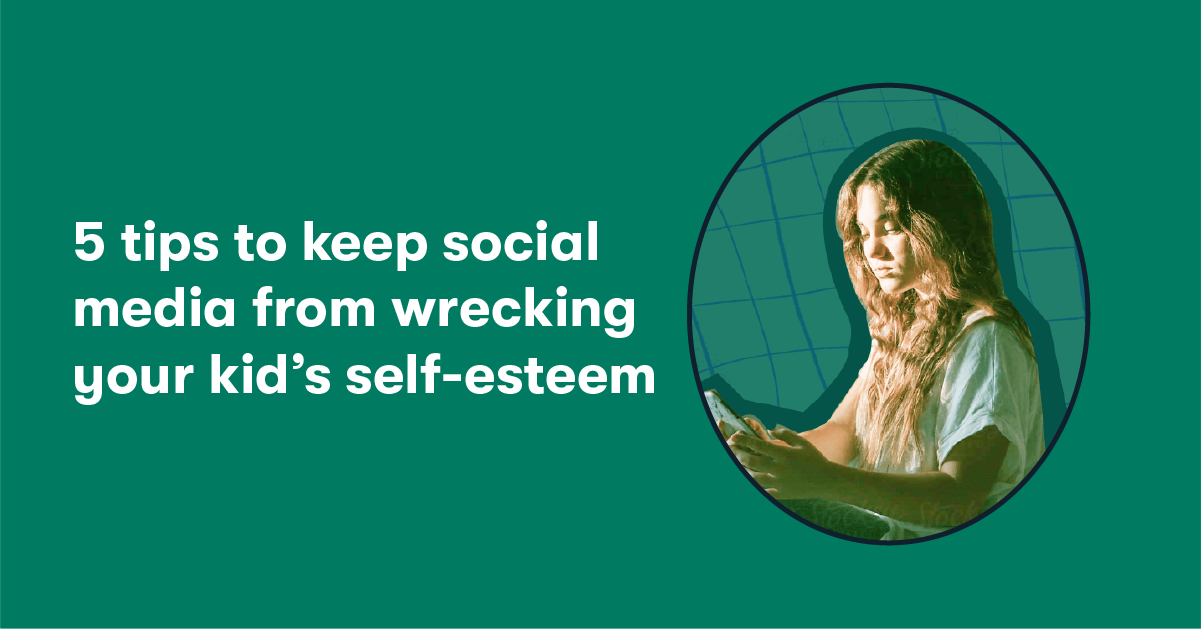5 tips to keep social media from wrecking your kid’s self-esteem

By Alexandra Boeving Allen, PhD, Feb 14, 2023
From what you may hear or read, social media can sound like an unhealthy mix of cyberbullies and overly perfect influencers — ie, the last place where you want your kid to spend most of their waking hours. But don’t delete TikTok from their phone just yet! The vast majority of teenagers actually have a lot of positive stuff to say about social media.
In a 2018 Pew survey, 81 percent of teens said that social media helped them stay connected to their friends. 69 percent felt it allowed them to interact with a more diverse group of people, and almost the same amount — 68 percent — said they’d found people online who would support them through tough times.
So how can you try to ensure that your kid has more positive experiences on social media — and less of the bad stuff? These 5 simple things can help.
Talk about it
Check in with your teen about how social media’s working for them right now. How do they feel when they’re on YouTube for hours on end? How do they feel when they’re not? What do they wish they could change about the experience? You may not get deep answers right away, but creating an open dialogue can help you and your teenager stay in touch about how social media is (or isn’t) impacting them.
Keep an eye out for good content
Yes, you can be a parent and still find interesting accounts and inspiring role models on social media that your kid may not have seen before. For instance, a teenager who reads a lot could appreciate you occasionally sharing recommendations from #BookTok, and a vegan kid may not cringe (too much) when you text them a cool smoothie bowl recipe you saw on Instagram.
Help them explore their interests
Whether your kid’s obsessed with flamenco or wants to learn how to keep bees, talk to them about how they can use social media to pursue their interests. If they’re open to your help, brainstorm some ways they can do that, whether it’s posting dance videos or reaching out to a beekeeping influencer to find out how they got started. (Don’t forget to talk with your teen about the risks that come with putting their images or personal info online. You may want to set some ground rules, like making sure they share content with you before posting.)
Encourage them to create community
Feeling like they’re part of a group can help your kid feel more comfortable exploring who they are, especially when it comes to aspects of their identity like their race, gender, and sexual orientation. Encourage your kid to safely connect with others on social media who have similar interests or shared lived experiences. Nonprofits or groups connected to schools or communities are a great place to start. Your kid’s counselor or teacher can also make suggestions.
Urge them to stay grounded
If your kid’s seeing things on social media that make them feel “less than,” point out that not everything they see is real. The opposite is true, too — if they’re racking up likes for their social media persona, remind them that their real self is great, too. Either way, encourage your kid to cultivate some screen-free time so they can stay in touch with who they are in real life.
Remember: You know your kid best. If social media seems to make them feel worse, not better, about themselves, or you’re concerned about the amount of time they spend online, setting limits as a family could help. If you think your teen could benefit from some extra support, your Brightline coach is always available to help.